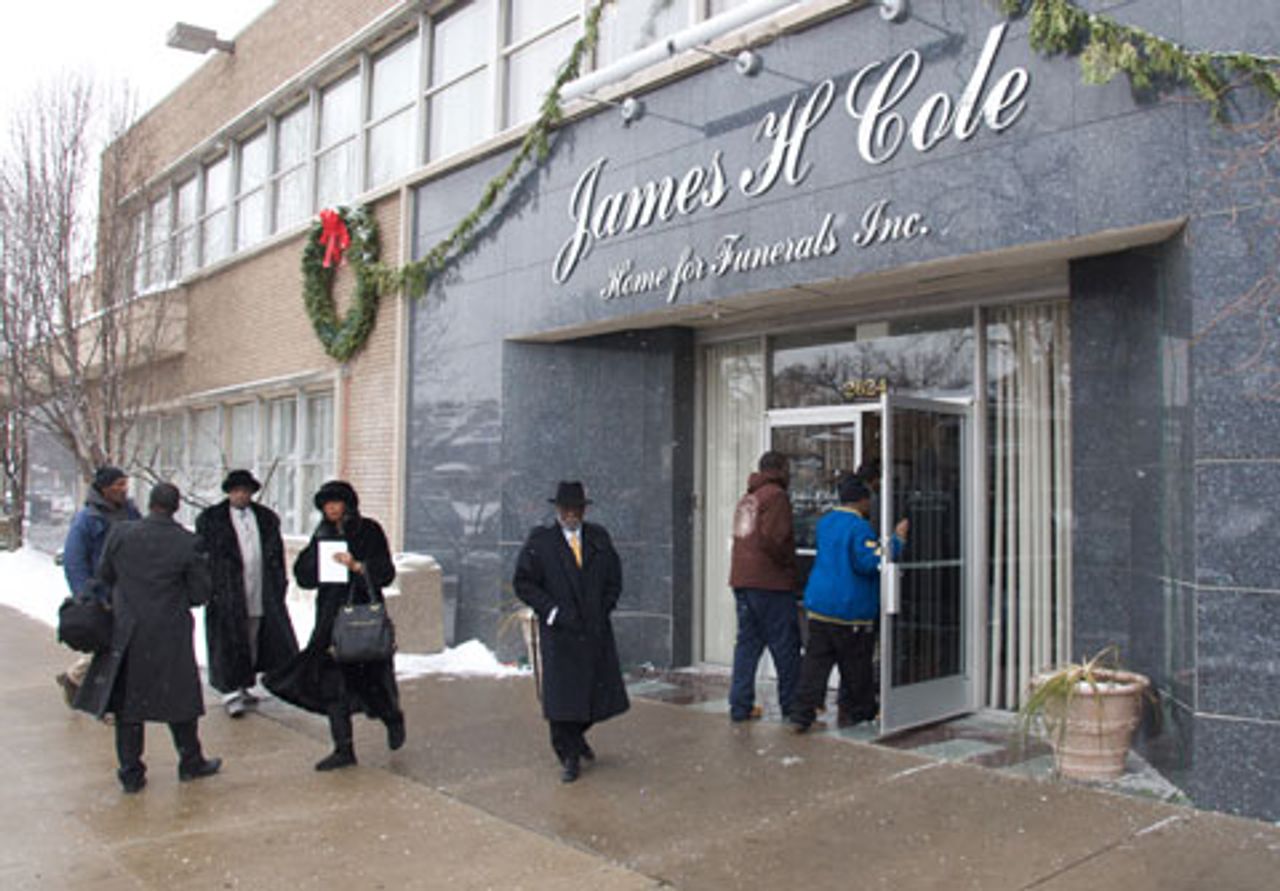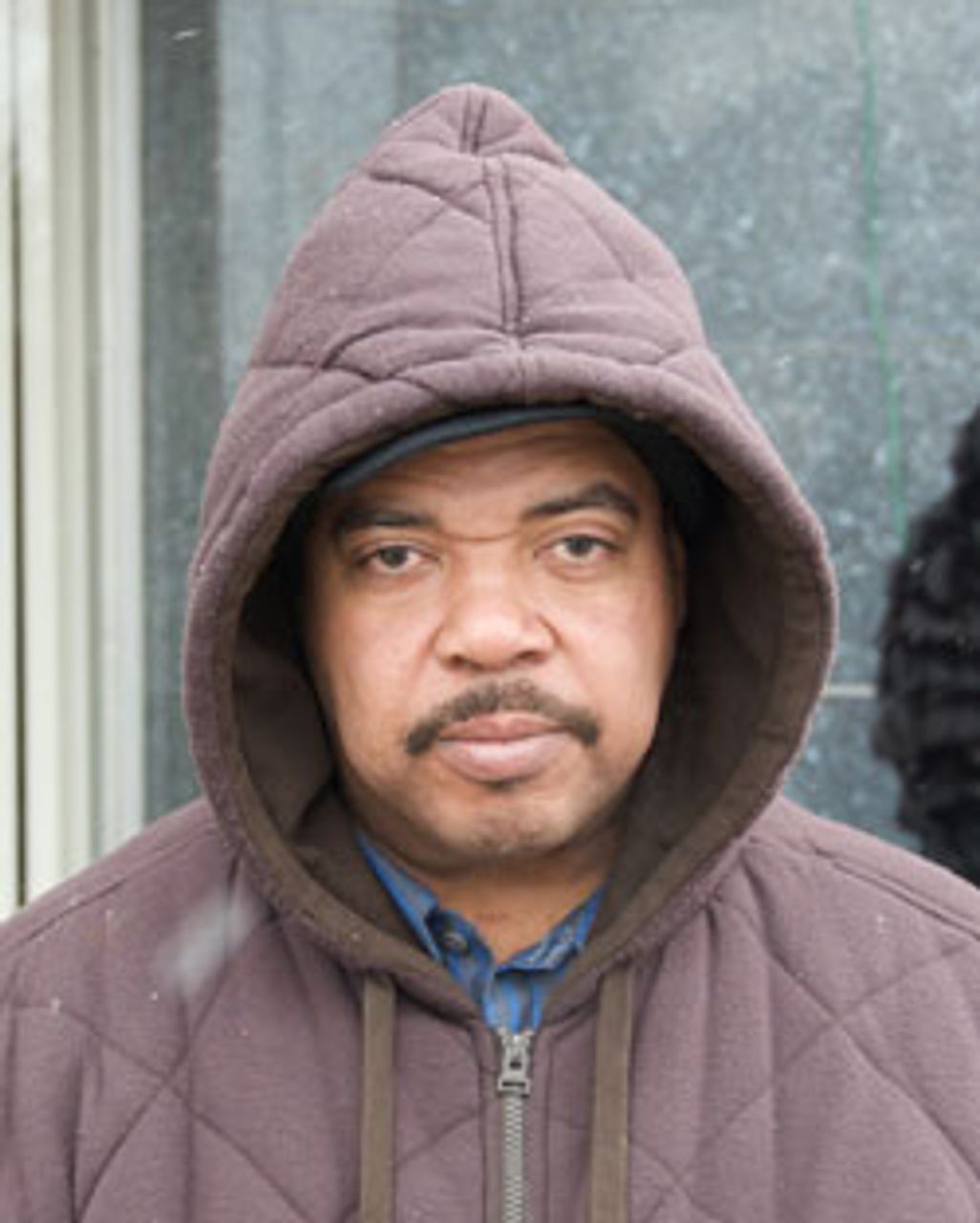On Monday, January 11, more than 300 hundred people crowded into Cole’s Funeral Home in Detroit to pay their respects to Marvin and Tyrone Allen, two of the three victims of a January 5 house fire.
 Cole’s Funeral Home
Cole’s Funeral HomeThe blaze was likely set off by a space heater, which was used to warm the home after the family’s heat and electricity had been shut off by the utility company. The fire took place on one of the coldest days of this year, when temperatures dropped to 4 degrees Fahrenheit, with a wind chill of minus fifteen.
A memorial service was held in place of a normal funeral for Marvin, 62, and his brother, Tyrone, 61, due to the severity of the burns from the fire. The third victim of the fire was the girlfriend of Tyrone, Lynn Greer, 58. The sole survivor of the early morning fire was Ronald Gross, 46, the nephew of the Allen brothers, who escaped by jumping out of a second floor window.
Both Marvin and Tyrone were disabled and required a cane to walk.
While the space heater is suspected, the Detroit Fire Department has said that the cause of the fire remains under investigation.
The deaths caused by the fire in the near west side of the city bring the number of fire-related deaths to eight since December 31, 2009. According to the Detroit Fire Department, there were 44 fire-related deaths last year, slightly higher than the 41 deaths in 2008.
Some 221,000 households in southeast Michigan had their utilities shutoff in 2009, a 50 percent increase over 2008. Multiplied by the state average of 2.5 people per home, this means 552,500 residents were living without utilities.
According to DTE Energy, 400,000 of its 2.7 million customers are currently behind in their payments. This means that they also face the danger of losing utilities in the spring, when the majority of shutoffs go into effect.
A report issued last month by the National Energy Assistance Directors Association (NEADA) found that 4.3 million households in the US had their utilities disconnected in 2009, up from 4.1 million in 2008.
Anger at the utility shut-off and the needless deaths that it caused was palpable at the funeral. The WSWS spoke to several friends and relatives about the fire and social conditions facing working class families in Detroit.
 Deanna Tiller, niece of Marvin and Tyrone Allen
Deanna Tiller, niece of Marvin and Tyrone Allen“It’s not fair,” Deanna Tiller, niece of the Allen brothers, said. “My uncles tried to get extra help; they had help from the system before. And it’s a shame that once you get help one time, you know the way the economy is now, people need help again. And that’s what happened. They wouldn’t help them any more.”
“No one should lose their lives because they have to steal power to stay warm,” Deanna continued, referring to reports that the house may have been illegally rigged for electricity to power the heater.
“I lost three people I love. Three people. And we are not the last ones who will lose loved ones because of this.”
“This is a terrible tragedy,” said Aaron Bowers, a close friend of the family. “They turned off the utilities and so many people are in the same circumstances. Lights cut off, gas cut off. What are you going to do? People have to survive. What are they going to do to survive?”
 Aaron Bowers
Aaron Bowers“We need jobs in this city,” Bowers added. He pointed to the once proud neighborhood across the street from the funeral home, which also sits next to the Motown Museum, home of the famous Motown Record Company. “All people need is decent paying jobs. With a job people can take care of themselves. But without a job, where is the money going to come from?”
A young worker who did not want to give his name was visibly furious. “I feel they shouldn’t have been cut off,” stated the young man. “For people 60 years-old or older, I think it is ridiculous.”
“I had similar circumstances,” he continued, relating his experiences with DTE. “I said, ‘Look, I have kids here. We can work out some kind of payment.’ They said, ‘No, you have to pay the bill.’ I told them I have other bills to pay. I sent in a partial payment. But that wasn’t good enough—they want the whole thing.”
Claudette Cameron, a long time friend of Marvin Allen, was also opposed to the utility shutoffs. “Utility shut offs? I see it a lot. I live in the heart of the neighborhood in Detroit and you see a lot of it.”
“I think it is a very sad situation,” Cameron said. “I think the utility companies need to work more with the families in the city and the suburbs because of the economic times we are living in. Right now, a lot of people can’t afford to pay their utilities.”
“I think that the US government could pour more dollars to help, instead of giving to General Motors and Chrysler and the Wall Street bankers, all those billions of dollars. Some of that money should be down here for the average citizens.”
David, a construction worker, said, “I think that DTE should do something that gives back to the people, because they have taken so much away from us. If they see that people are not working, surely there is something that they can do.
“There are no jobs. Or if you get one it pays $7 an hour. How do you pay your rent, your lights, and transportation and food off that? You can’t do it. And when people do pay one month, they may not be able to pay again the next month.
“To be frank, a poor person cannot live on the amount of money he is being paid. And yet they do not want to cut the top. You cannot cut me from $16 an hour down to $7 an hour and not cut the cost of everything else. Look at the cost of living—gas, lights, it is impossible for a working man. And look at the bonuses. What is it all about? It’s to keep the poor man poor and the rich richer.”
